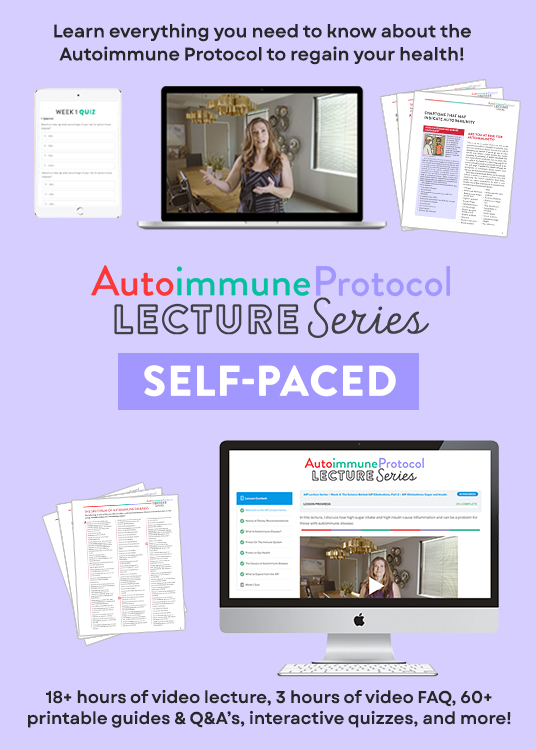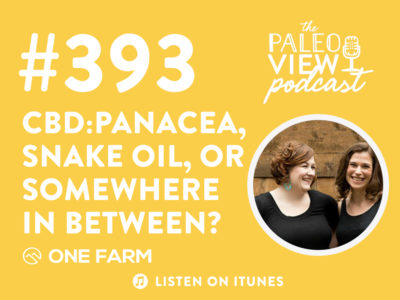On this week’s episode, Stacy and Sarah share the science surrounding CBD usage. How is CBD being tested within the medical community? How do we use this information for our own personal application? And if you incorporate CBD into your life, what should you be aware of? All of this and more in episode 393!
If you enjoy the show, please review it on iTunes!
The Paleo View (TPV), Episode 393: CBD: Panacea, Snake Oil, or Somewhere in between?
Welcome back to the Paleo View, episode 393 if we have done our simple math correctly! (0:40)
Stacy received a few messages this week from people who are catching up on old episodes of The Paleo View.
Sarah loves the way this show has evolved over the years.
When you focus on education and science and always being open to learning more and always working to achieve your healthiest self, it might look different in eight years.
Sarah loves that they give listeners this really broad education.
They share everything surrounding these health topics and really get into the details so that people can understand their own bodies and make informed day to day choices.
That is what Sarah feels all of this is about.
Being rooted in science gives us room to learn, change and evolve.
Sarah always wants her recommendations to reflect the latest science.
Save 70% Off the AIP Lecture Series!
Learn everything you need to know about the Autoimmune Protocol to regain your health!
I am loving this AIP course and all the information I am receiving. The amount of work you have put into this is amazing and greatly, GREATLY, appreciated. Thank you so much. Taking this course gives me the knowledge I need to understand why my body is doing what it is doing and reinforces my determination to continue along this dietary path to heal it. Invaluable!
Carmen Maier

Whatever labels you identify with, Sarah and Stacy hope that the information on this podcast helps you make the best choices for you.
A New Topic for The Paleo View
On this episode, Stacy and Sarah are going to talk about CBD products.
Stacy wants listeners to go into this open-minded, just as Stacy and Sarah went into their research open-minded.
The science changed Stacy’s mind.
Keep an open mind and see if the information resonates with you in some way.
Stacy has seen a significant change in her husband since he started taking CBD.
When anxiety gets extreme for Stacy, she too takes CBD.
For this week’s episode, when Stacy and Sarah were looking for a sponsor they wanted to find someone who tested the CBD and used an organic growing process and had control over their supply chain.
Stacy and Sarah partnered with One Farm by WAAYB because they check all of those boxes.
Sarah really likes One Farm’s extraction process as it is chemical-free.
They control every step of their production process.
Their flavorings are purely made with essential oil and are very palatable to consume.
Stacy and Sarah are very excited to welcome this new sponsor.
If you would like to try One Farm, use the code ‘PALEOVIEW’ at checkout and receive 15% off.
What is CBD?
CBD is an abbreviation for the phytochemical cannabidiol, a non-psychoactive component of Cannabis sativa. (12:30)
This is a different constituent from THC (tetrahydrocannabinol), the phytochemical responsible for the mental changes associated with marijuana use.
When we talk about CBD, we’re talking about an isolated chemical compound from Cannabis that will not have any effects on personality apart from potentially being calming/relaxing.
Stacy wanted to make it clear to listeners that CBD is legal in all 50 states.
It works by interfacing with the endocannabinoid system.
The endocannabinoid system is one of the key endogenous systems regulating pain sensation, with modulatory actions at all stages of pain processing pathways.
Because it is part of this pain sensory system it is also part of all physiological systems that modulate healing.
This is also the same system in the body that might make you feel physical pain when you feel intense emotional pain.
So it is connecting pain neurons.
The endocannabinoid system is involved in a host of homeostatic and physiologic functions, including modulation of pain and inflammation.
Chronic pain is a symptom of so many things. (26:14)
And chronic pain itself can cause so many things, like anxiety, irritability, low self-esteem, decreased productivity, depression, insomnia, suicide risks and more.
Stacy shared a bit about her experience with chronic pain.
There is a lot of research pointing to a fundamental role in the endocannabinoid system with inflammatory diseases that are related to lifestyle.
How CBD Works in the Body
The way that CBD works in the body is by binding with these two families of receptors that we have. (30:47)
They are called CB1 and CB2, and these are the two main receptors of our endocannabinoid system.
In general, CB1 receptors are found in the central nervous system.
CB2 receptors are found in the periphery and are found in virtually every tissue in the human body.
Depending on which receptor is being bound, this is part of why there is both an impact on immune function and neurotransmitter function.
In particular, Sarah thinks it’s very interesting to look at how CBD is changing or activating neurotransmitters.
CBD is changing serotonin, which creates this cascade of chemical reactions.
The end product is increasing the production of serotonin.
CBD is also able to interact with our GABA system, which is our main calming neurotransmitter.
There are also other receptors that CBD can potentially react with.
These are effects that are separate from the CB1 and CB2 receptors.
It has a direct impact on bone mineralization.
CBD also appears to reduce cell division of cancer cells and seems to degrade the plaque associated with Alzheimer’s disease.
There is also an impact on insulin sensitivity and metabolism.
Digging Deeper Into the Science
Overall CBD is anti-inflammatory. (38:05)
It is known to inhibit some really important chemical messages of inflammation.
This anti-inflammatory effect has been studied in a variety of different diseases in which inflammation is part of the pathogenesis.
One well-studied example is inflammatory lung disease.
There is a lot of evidence that use of CBD reduces the immune response, allowing the lungs to function appropriately.
Specifically, CBD inhibited the migration and action of several immune cells, including neutrophils, macrophages, and lymphocytes and their associated pro-inflammatory cytokines.
CBD has also been studied in neurodegenerative diseases Parkinson’s, Alzheimer’s, multiple sclerosis, and HIV-associated dementia as well as cancer.
In addition, CBD is being studied as an immunomodulating compound in the management of autoimmune diseases.
This acts by reprogramming pathological memory T cells (the ones that tell the immune system to attack our bodies).
Just taking out these little bits and pieces, you can see why this is a topic that Stacy and Sarah felt was worthwhile tackling.
CBD is something that has the possibility of being an adjunct in many situations that is going to potentially add to how our body is positively responding to all of the other healthy diet and lifestyle things that we are doing.
Personal Application
Stacy wanted to point out that they are not medical professionals. (46:13)
If you are going to embark upon trying CBD to see how it can help your health, pay attention to how it makes you feel.
Stacy shared her experience with incorporating CBD into her life and how she monitored her body’s response.
Make sure that you use a brand that is consistent and quality, which is why Stacy and Sarah partnered with One Farm.
Sarah feels like this is the right place to talk about the boundaries of the knowledge of CBD.
We understand a lot of the mechanisms, we have preliminary data showing benefits in a lot of different chronic disease states, and we can understand what is happening for that benefit.
However, what we don’t yet have is dose-response studies.
We don’t have details on how much, how often, or what form for any disease states.
Sarah pointed out that as with any supplement, it is best to talk to your doctor first before incorporating it.
There are also possible drug interactions that you must be careful with, which is why you need to involve your doctor in this process.
Keep in mind that the science is really exciting, but we are not at the point yet where the science paints a full picture.
Closing Thoughts
If you are compelled by the science of CBD and it is something you would like to experiment with (with medical supervision) want to experiment with, Stacy and Sarah are supporters of One Farm. (55:14)
You can learn more at this link.
And if you are ready to order, you can get 15% off with the code ‘PALEOVIEW’.
Stacy thanked Sarah for diving into the science.
Thank you for listening!
If you enjoyed the show, please be sure to share it with others who would appreciate this information.
We will be back again next week! (57:03)




 How Does Sugar Fit into a Healthy Diet?
How Does Sugar Fit into a Healthy Diet?